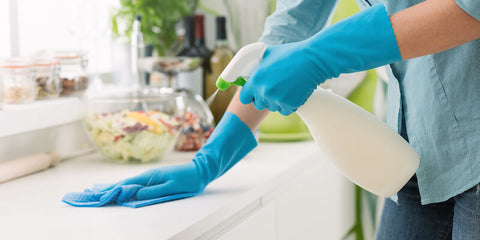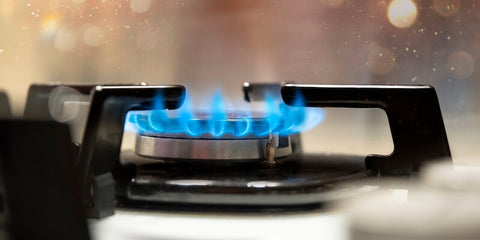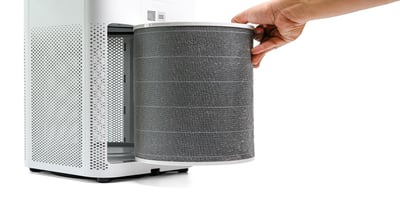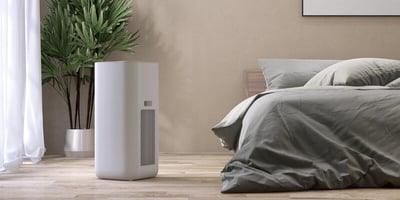Why are people becoming increasingly concerned about indoor air pollution?

As we continue to adapt to the pandemic, COVID-19 restrictions are now easing and workers are mostly allowed to return to the office. Many people are still choosing to work from home (WFH) though, as it provides them with a great work-life balance, not to mention the absence of commuting. However, while the WFH lifestyle is a silver lining to the pandemics’ chaos, people need to take caution to the air quality of their homes as they are now spending the majority of their days there. Your indoor air quality is a key factor to improving your WFH lifestyle and here’s why:
What is Indoor air pollution
When people think of pollution their minds tend to factories and large cities and less to their own homes. But indoor air pollution exists and like outdoor pollution can pose serious risks to our health.

Indoor air pollution comes from dirt, dust and gasses and includes volatile organic compounds (VOCs) and other harmful chemicals, released from a variety of sources within our own homes:
Indoor air pollutants
- Tobacco products
- Building materials and furnishing
- Household cleaning products
- Mold
- And our gas stove ovens
- PM 10
- PM2.5
Outdoor air pollutants
Outdoor variables can influence the air quality of your home as well depending on,
- Radon levels in the ground for homes with basements
- Asbestos use
- Pesticide use
- And nearby outdoor pollution
Your gas oven is a major source of indoor air pollution
This past January a slew of articles in the news came out against the familiar gas stove as experts brought forward some hidden dangers of having one in your home. And it’s true that this popular choice of stove widely contributes to indoor air pollution.

Gas stoves rely on the direct combustion of natural gas which leads to the release of harmful gasses like nitrogen dioxide (NO2) and methane. The study that led to the danger of gas stove emergence found that gas stoves can leak significant amounts of planet-warming methane into the air even when off, and found in some cases levels of indoor air pollution that would be considered illegal outdoors under national air quality standards
And while this could be scary considering most of us use gas stoves, in the average home levels are not found at such high risks. But, understanding the threat could help improve your home's air quality.
Why you should check your indoor air quality
As people are spending more time at home than pre-pandemic days, it’s now more important than ever to monitor your home's indoor air quality.
A research group at Texas A&M University highlighted this concern when they explored how indoor air quality impacts human health as the WFH lifestyle is on the rise. They compared the indoor air quality of employee homes and their office over several months and found that the homes were significantly more polluted with higher VOC concentrations. As they suspected, employees reported having higher frequencies of health symptoms during work from home periods. And as WFH continues to grow, home air pollution could become a workplace health issue.
How poor indoor air quality can affect your health
The World Health Organization (WHO) estimates that 3.8 million people worldwide die from indoor pollution. And while that points mostly to extreme circumstances, when door air quality is poor it can lead to a range of adverse health effects. The US Environmental Protection Agency warns that health effects could be experienced soon after exposure or possibly years later.
Short-term health effects
- Irritation of the eyes, nose and throat
- Headaches
- Dizziness
- Fatigue
- Cold-like symptoms
- Aggravates asthma
Long-term health effects
- Respiratory diseases
- Heart disease
- Cancer
It also depends on individuals’ pre-existing health conditions, leaving some populations, like the elderly, at higher risks. While pollutants commonly found from cooking and cleaning can have an impact, uncertainty remains large about how much exposure and at what concentrations produce health concerns.That’s why it’s important for people, especially those working from home, to be mindful of their indoor air quality and look for ways improve their home’s their air quality.
How to improve indoor air quality in your homes
Taking steps to improve indoor air quality is actually quite simple.
Clean House
Keeping a clean house can help keep a healthier home, because good hygiene can greatly reduce dust. Pollutants can get caught in household items and therefore vacuuming carpets with HEPA filters, changing bedding more often and clearing away clutter can help improve indoor air quality especially for those with allergies and asthma.
Store away cleaning products
After you're done cleaning your home make sure to store your cleaning products away from the living areas in your home. As many cleaning and home products, like paint and varnishing contain VOCs, keep these items in an outdoor shed or garage to ensure
Crack open your windows
Having air flow through your homes is so important to keeping the air circulating your home fresh. Especially when you use your gas stove, opening the window can help remove the harmful pollutants. The EPA says that having good indoor ventilation is the most effective way to maintain a healthier indoors.
Install an air purifier
And while cracking a window may be less attractive in the winters, using an air purifier is another great way to actively eliminate pollutants. Air purifiers work to suck in the surrounding air, capture pollutants and push back the filtered and cleaner air into the living space. Air purifiers are a great tool for controlling your home’s air quality and even the researchers at Texas A&M suggest that companies should consider providing their remote workers with air purifiers.
Best air purifiers for working at home
There are many air purifiers on the market but choosing the most pollutant-effective one is your best plan. Purifiers with high efficiency small particulate air (HEPA) filters are favorable because they trap the smaller particles that regular filtration can’t. The Sensibo Pure air purifier is made with medical grade HEPA and carbon filtration to trap contaminants as small as bacteria and viruses and to absorb harmful gasses such as smoke and VOCs.
Sensibo Pure is also perfectly designed for the busy remote worker. The smart air purifier can easily be controlled by voice command or through your phone from anywhere, making it easy to manage while you're slumped at your desk. Plus, the purifier has built in sensors that automate high speed filtration when air quality dips, so you can feel safe with no effort.
As we continue to adjust to the new life since the pandemic, having a smart and effective air purifier can help improve your indoor air quality and effortlessly contribute to a better work (from home)-life balance.





































.jpg?height=200&name=photo_2024-03-18_16-41-15%20(1).jpg)

.jpg?height=200&name=photo_2024-03-28_19-57-48%20(1).jpg)